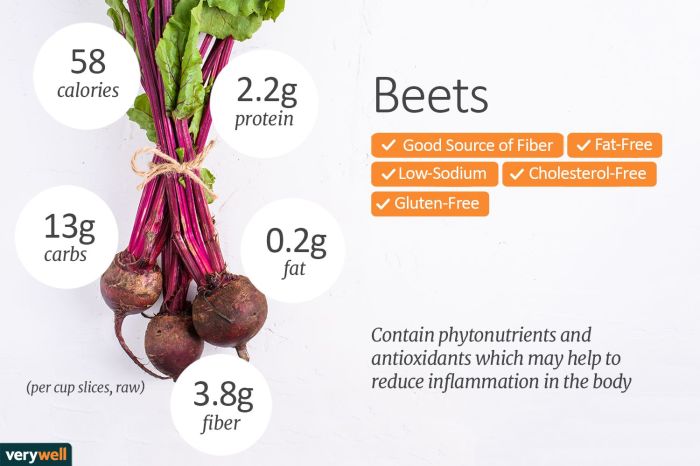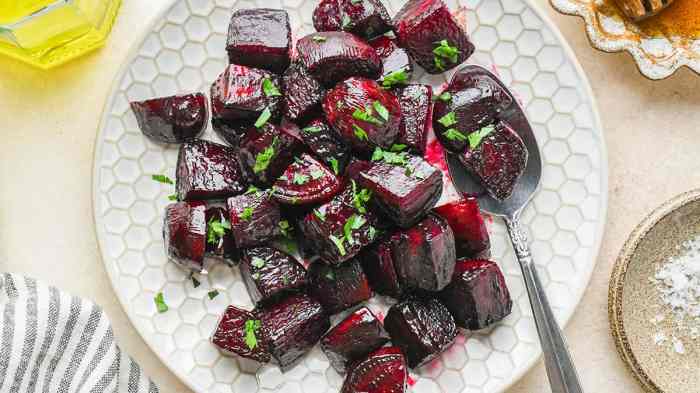Health Benefits of Cooked Beets: Nutrition Facts Beets Cooked

Nutrition facts beets cooked – Unlocking the vibrant potential of cooked beets reveals a treasure trove of health benefits, extending far beyond their earthy sweetness. These root vegetables, readily available and easily prepared, offer a powerful boost to overall well-being, impacting everything from cardiovascular health to athletic performance. Let’s delve into the science behind these remarkable benefits.
Cardiovascular Health Improvements from Cooked Beets
The remarkable cardiovascular advantages of cooked beets stem largely from their high nitrate content. Nitrates are converted in the body to nitric oxide, a powerful vasodilator. This means nitric oxide relaxes and widens blood vessels, improving blood flow and lowering blood pressure. This improved circulation reduces strain on the heart, contributing to better cardiovascular health and potentially decreasing the risk of heart disease and stroke.
Studies have shown that regular consumption of beet juice, and by extension, cooked beets, can lead to significant reductions in systolic and diastolic blood pressure, even in individuals with hypertension. The effect is often noticeable within hours of consumption, highlighting the immediate impact of these potent nitrates.
- Reduced blood pressure: Nitric oxide’s vasodilatory effect directly lowers blood pressure, easing the burden on the cardiovascular system.
- Improved blood flow: Enhanced blood flow ensures that oxygen and nutrients reach vital organs and tissues more efficiently.
- Reduced risk of heart disease and stroke: By lowering blood pressure and improving circulation, cooked beets contribute to a lower risk of these serious conditions.
Enhanced Athletic Performance Through Beet Consumption
The improved blood flow facilitated by nitrates in cooked beets isn’t just beneficial for overall health; it significantly enhances athletic performance. By increasing the efficiency of oxygen delivery to muscles, cooked beets can boost endurance, reduce perceived exertion during exercise, and improve overall athletic capacity. This effect is particularly pronounced in endurance activities like running, cycling, and swimming.
So, you’re checking the nutrition facts for cooked beets? Good for you, earthy veggie lover! But if you’re craving something a little less…earthy, maybe check out the minute maid light lemonade nutrition facts before you completely commit to that beet-fueled marathon. Then, back to those beets – remember, moderation is key, even with superfoods (unless it’s chocolate, then moderation is optional).
Imagine a marathon runner benefiting from improved oxygen uptake, allowing them to maintain a faster pace for longer periods. This is the tangible impact of cooked beets on athletic performance, fueled by their nitrate-rich composition.
Antioxidant Properties and Disease Prevention, Nutrition facts beets cooked
Beyond their cardiovascular and athletic benefits, cooked beets are rich in antioxidants, compounds that protect cells from damage caused by free radicals. These free radicals contribute to aging and the development of chronic diseases such as cancer, Alzheimer’s disease, and other degenerative conditions. The antioxidants in cooked beets help neutralize these harmful free radicals, acting as a shield against cellular damage and potentially reducing the risk of these chronic illnesses.
The vibrant color of beets is a testament to their potent antioxidant profile, a visual reminder of their protective properties.
Cooked Beets in Culinary Applications

Cooked beets, with their earthy sweetness and vibrant color, offer a delightful versatility in the culinary world. Their adaptability allows them to seamlessly integrate into a wide array of dishes, adding both nutritional value and visual appeal. From simple side dishes to more complex gourmet creations, cooked beets consistently deliver a unique and satisfying culinary experience.
The following sections will explore the diverse applications of cooked beets in various recipes, techniques for enhancing their flavor and texture, and effective storage methods to preserve their goodness.
Recipes and Dishes Featuring Cooked Beets
Cooked beets are surprisingly adaptable and can be the star of the show or a delightful supporting player in numerous dishes. Their naturally sweet flavor pairs well with both savory and sweet elements, making them incredibly versatile.
- Roasted Beet and Goat Cheese Salad: Roasted beets offer a concentrated sweetness and tender texture, perfectly complementing the tangy goat cheese and a light vinaigrette.
- Beet Borscht: This classic Eastern European soup showcases the earthy flavor of beets in a hearty and flavorful broth, often including potatoes, cabbage, and herbs.
- Beetroot Hummus: A vibrant twist on traditional hummus, incorporating cooked beets adds a beautiful color and subtle sweetness.
- Beet and Walnut Relish: A sweet and savory relish, perfect as a topping for grilled meats or fish, or as a side dish.
- Chocolate Beet Cake: Believe it or not, beets add moisture and a subtle sweetness to chocolate cakes, resulting in a surprisingly delicious and healthy dessert.
Methods for Enhancing Beet Flavor and Texture
The cooking method significantly impacts the final flavor and texture of cooked beets. Experimenting with different techniques allows you to tailor the beets to your preferred culinary application.
- Roasting: Roasting intensifies the beets’ natural sweetness and creates a tender, slightly caramelized texture. A simple toss with olive oil, salt, and pepper before roasting enhances the flavor.
- Boiling: Boiling is a quick and easy method, resulting in a softer, more easily mashed texture, ideal for soups or purees. Adding a touch of vinegar or lemon juice to the boiling water helps retain the color.
- Steaming: Steaming produces a tender beet with a vibrant color and a cleaner flavor profile, preserving more nutrients compared to boiling.
- Pickling: Pickling transforms beets into a tangy, flavorful condiment with a crisp texture, perfect as a side dish or addition to sandwiches.
Storing Cooked Beets
Proper storage is crucial to maintain the nutritional value and quality of cooked beets. Following these tips will ensure your beets remain fresh and flavorful for longer.
- Refrigeration: Cooked beets should be stored in an airtight container in the refrigerator for up to 5 days.
- Freezing: Cooked beets can be frozen for longer storage. Blanch them briefly before freezing to maintain their color and texture. They can be stored frozen for up to 3 months.
Visual Representation of Cooked Beets
The appearance of cooked beets varies greatly depending on the cooking method and the variety of beet used. This visual representation describes the potential outcomes.
Roasted Beets: Imagine deep crimson or ruby red beets with slightly softened edges, possibly showing some caramelization at the surface. Their texture is tender, almost meltingly soft in the center. The color is intense and vibrant.
Boiled Beets: Picture a more uniform color, a consistent deep red or burgundy, with a softer, more easily mashed texture. The color may be slightly less intense than roasted beets, potentially appearing slightly duller.
Steamed Beets: Envision a vibrant, almost jewel-toned red or burgundy color, retaining a firmer texture than boiled beets, yet still tender enough to easily pierce with a fork. The color is bright and vivid.
Pickled Beets: Visualize a vibrant, often reddish-pink or purplish-red color, depending on the pickling liquid. The texture is crisp and firm, with a slightly glossy appearance due to the pickling brine.
Key Questions Answered
Can I eat cooked beets every day?
While generally safe, daily consumption of large quantities of beets might lead to beeturia (red urine) in some individuals. Moderation is key.
Are cooked beets good for weight loss?
Cooked beets are relatively low in calories and high in fiber, which can contribute to feelings of fullness and aid in weight management as part of a balanced diet and exercise program.
How long can I store cooked beets?
Properly stored cooked beets can last for 3-5 days in the refrigerator. Refrigerate in an airtight container.
Do cooked beets lose their nutrients when microwaved?
Microwaving can lead to some nutrient loss, though generally less than boiling. Steaming or roasting are often preferred for optimal nutrient retention.
